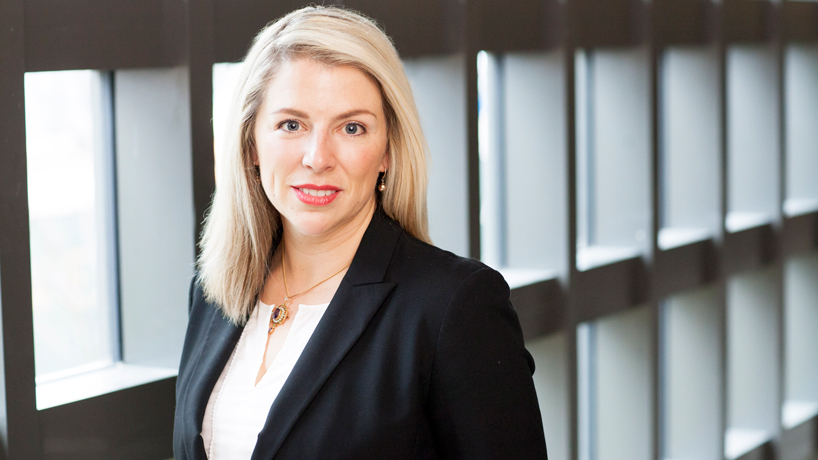
Jennifer Ehlen, an alumna of UMSL’s College of Business Administration, opened Brazen Global in 2017. The company, which takes a business-first approach to empowering female entrepreneurs, is the evolution of Prosper Women Entrepreneurs. (Photo courtesy of Jennifer Ehlen)
When Jennifer Ehlen speaks about the consumers of her company, she habitually refers to them in feminine pronouns. Always “she” or “her.” Never “clients,” “members” or any other impersonal description.
Even Ehlen’s most general characterizations of the company’s benefits sound intimate, as if she’s recalling an individual struggle or drawing from a friend’s experience. With Ehlen’s background as a business owner, former director of a private equity firm and an active feminist, chances are that the explanations are personal.
Ehlen, the founder and CEO of Brazen Global as well as an alumna of the University of Missouri–St. Louis, has shaped her career around creating a more prosperous future for women in business, particularly entrepreneurs. Leading Brazen’s all-women executive team, Ehlen, BSBA 1999, takes a business-first approach to helping female entrepreneurs in the St. Louis area advance their companies. She says it’s all done boldly and without apologies – the literal definition of the word “brazen.”
“One thing that makes us different and unique from other women’s organizations is that while others may work with women on a broader approach of female empowerment topics that are all important and worthwhile, Brazen is business first,” she said. “We go deep in the vertical of entrepreneurship and running a company, growing that company and taking it to the next level while also being cognizant of the pros and cons you may face because you are a woman.”
Brazen’s approach includes a variety of programs, namely small peer advisory groups, private meetings with subject-matter experts and events that narrowly focus on a specific topic or industry. Most of these programs have limited registration space, allowing participants to feel comfortable and have opportunities to ask relevant questions.
“Our programs are designed to feel seemingly hyper niche and customized to her specific business, industry, stage of business and personal journey,” Ehlen said. “All of our programs have been designed such that they can be relevant and customizable.”
Before Brazen, Ehlen opened Prosper Women Entrepreneurs in 2014 after American Express released a report about the state of women-owned businesses. The study ranked 25 metropolitan communities in terms of how female entrepreneurs faired in those areas. St. Louis and San Francisco tied for last, which led Ehlen to ask, “What’s our excuse?”
Since she began pondering that question – one which she still hasn’t found a firm answer to – Ehlen helped Prosper launch an accelerator that invested more than $2 million in women-led businesses. Today, that fund is fully invested and Prosper has evolved into Brazen Global, which aims to take a more holistic approach to empowering women entrepreneurs.
Brazen’s empowerment efforts focus on both intrinsic and extrinsic factors that may prohibit women from growing their businesses. However, Ehlen says Brazen primarily concentrates on intrinsic factors, pointing to a study about women’s career habits as a main reason why.
She cites several studies which found that a majority of women will only apply for jobs or promotions if they believe they meet 100 percent of the qualifications, whereas a majority of men will apply for the same positions if they meet as little as 60 percent of the criteria.
Ehlen believes it’s time for Brazen women, and females alike, to bridge that gap.
“We want her to feel as prepared and educated as possible,” Ehlen said. “Confidence is also about education. If she feels like she knows what she is talking about, knows what words to use and what questions are going to be asked, she is going to be more comfortable pitching for capital or pitching to a customer. Brazen can help her get prepared on all of the above.”
Another key component of Brazen’s benefits package is access to an extensive network of other female CEOs and business leaders. Ehlen says a lack of female representation in certain fields can hinder career advancement. By bringing business leaders together, she hopes to build confidence in Brazen members and create opportunities for collaboration.
“Oftentimes there are still no trailblazers to show us the path,” Ehlen said. “There are still not enough role models ahead of us to show us that is possible. Brazen can help make those mental connections as well as those personal and physical connections as they are looking to grow their companies.”
Growing up in Mexico, Missouri, amid a population of about 11,000 people, Ehlen’s role models were the small business owners within her hometown. She remembers local restaurateurs, a butcher and a dance studio owner as the town influencers. Even from a young age, Ehlen envied these business owners’ ability to create, sell and market.
“I think I caught the entrepreneurial bug very early,” Ehlen said. “I’ve dreamed for as long as I can remember about owning my own business someday. But I never knew that the business I would own would be the business of helping others start a business. That’s a little meta for me, but it works.”
Ehlen’s proud to be building those businesses in St. Louis, a region which she first felt connected to as a student in UMSL’s College of Business Administration. While studying management and organizational behavior, she developed lasting relationships that influenced her career trajectory.
“I felt very in touch with the St. Louis community through my time at UMSL,” she said. “I made connections with individuals who also built their homes here, including Dr. Art McCoy and his wife, Belinda, and my best friend Opal Jones. Those relationships that I formed and the friendships that we forged have now lasted the last 20 years of my life. The amount of faculty support and the accessibility of the faculty were also integral parts of my career advancement.”














